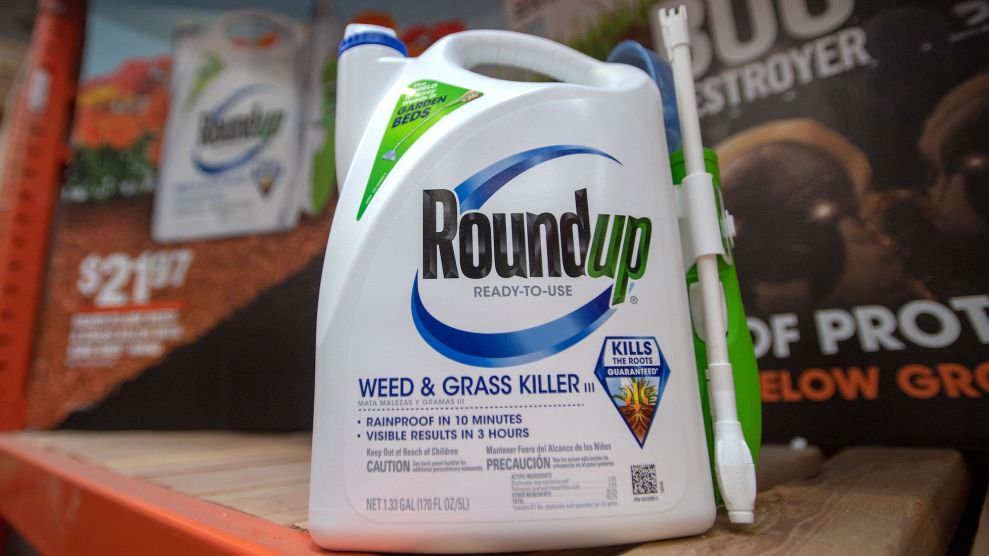
JOSH EDELSON/AFP/Getty Images
This story was originally published by Inside Climate News and is reproduced here as part of the Climate Desk collaboration.
The makers of Roundup, the world’s top weedkiller, will pay $6.9 million for violating an agreement with the state of New York to stop making false claims about the safety of its best-selling herbicides.
Bayer and Monsanto, which was acquired by the German agrochemical giant for $63 billion in 2018, violated a 1996 agreement with the state of New York to “immediately cease and desist” from making false and misleading claims about glyphosate-based Roundup products, the New York attorney general’s office announced Thursday.
Studies have linked glyphosate, the active ingredient in many Roundup products, to a wide range of harmful effects on pollinators, lab animals, and people. In March, a first-of-its-kind study linked Roundup to liver and metabolic disease in children.
Yet Bayer and Monsanto repeatedly advertised glyphosate-based Roundup products as safe and nontoxic without adequate substantiation, Attorney General Letitia James determined in an investigation that started three years ago.
These claims violated state laws against false and misleading advertising as well as a previous settlement the attorney general’s office reached with Monsanto in 1996. The 1996 settlement cited Monsanto ads claiming its glyphosate-based herbicides are “practically nontoxic” and “less toxic than certain common household products,” claims the attorney general concluded constituted false and misleading advertising.
Monsanto in turn committed to stop making unsubstantiated claims about the safety of its glyphosate-based Roundup products and agreed to pay the state $50,000 in costs.
In 2020, the attorney general’s office launched a new review of Bayer and Monsanto’s advertising materials and asked the companies to provide evidence backing up claims that the products are safe.
The investigation discovered multiple instances of false or misleading safety claims on multiple platforms and by Bayer employees, including assertions that ingredients in Roundup products are less toxic than dish detergent and soap.
“Once again, Monsanto and the company’s current owner, Bayer, made false and misleading claims about the safety of their products, but we will not allow them to get away with endangering our environment,” James said in a statement. “My office will continue to protect the health of New York’s environment by ensuring our laws are respected and followed.”
The agreement cites at least five examples of online videos claiming that Roundup weed and grass killer products “won’t harm anything but weeds.” The ads are no longer publicly available, in keeping with the terms of the agreement.
In one case, Bayer’s website claimed that glyphosate-based Roundup products do not result in adverse effects to honey bees or pose a threat to the health of animal wildlife. “In fact, glyphosate is an important tool that can help preserve the environment and biodiversity,” the chemical giant, valued at $55 billion, said. Bayer removed the web page as required, though it was captured by the Internet Archive.
The company also removed a page claiming that because glyphosate allows farmers to reduce tillage practices, which releases greenhouse gases from soil, it protects the environment for insects, birds, and wildlife, including pollinators. That page, too, is now available only on the Internet Archive.
These marketing materials violate state laws on business fraud, false and misleading advertising, and Monsanto’s obligations under the 1996 agreement, the attorney general’s office found.
James said in a statement that pesticides can cause serious harm to the environment and pose a deadly threat to wildlife, including pollinators and other species vital to agriculture. “It is essential that pesticide companies, even and especially the most powerful ones, are honest with consumers about the dangers posed by their products so that they can be used responsibly,” she said.
“We are pleased that the New York Attorney General’s Office has completed its investigation,” a Bayer spokesperson said, adding that the company was glad to reach an agreement to resolve the issue. The attorney general “made no findings regarding the safety of Roundup products and no scientific conclusion that they have caused harm to pollinators or aquatic species,” the spokesperson added.
The investigation did, however, note several scientific studies reporting evidence of harm to pollinators, whose numbers are declining for multiple potential reasons scientists believe, including widespread use of herbicides like glyphosate and climate change.
Recent studies show that glyphosate disrupts enzymes in gut microbes essential for health in people and other animals and that the herbicide may harm pollinators and aquatic organisms. One study, by a leading expert on how microbes affect their hosts, found that glyphosate upsets microflora in bees’ guts, making them more susceptible to infection.
The investigation cited these studies to determine that Bayer and Monsanto failed to substantiate advertising claims that Roundup weed- and grass-killer products are safe and non-toxic. and “won’t harm anything but weeds.”
The attorney general’s office also noted that Bayer and Monsanto “neither admit nor deny” the findings. In addition, the office noted that Bayer intends to stop selling glyphosate-based products in 2023, as a result of settling lawsuits worth billions of dollars alleging the products cause cancer in humans. The investigation did not, however, focus on glyphosate’s effects on humans. The products are still available in New York stores.
The attorney general’s office accepted the $6.9 million payment, due within 10 days of the agreement, and the companies’ assurance that they would “cease and desist” from publishing or broadcasting ads in New York that claim Roundup products are safe, non-toxic, and harmless to pollinators and aquatic organisms.
The money will be used for pollinator research, management, and programs designed to restore pollinator habitat and mitigate environmental pollution affecting bees and other pollinators.
If the agrochemical giants violate these terms, they must pay $100,000 in each case.















